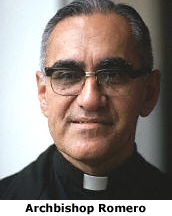One of the oldest characters in the history of man is the hero. Heroes began as fantastic examples of an ancient culture's morals and they evolved as cultures did. The concept of the modern hero varies, but in my opinion a hero is someone who does their best with what they are given. It is a person who feels empathy towards all and is willing to give up the things they care about most to ensure justice to those who do not have it. My hero is someone who, when challenged with the decision between what was popular and what was right, chose to stand up for thousands of persecuted people, even at the risk of his own life. He was not perfect; at first he gave in to what was socially acceptable by siding with the powerful and the wealthy, but he changed after witnessing just how inhumane that lifestyle was. My hero is someone who did not back down from his cause, despite threats of death. He gave up his comfortable life in order to instill justice in his nation and gave the ultimate sacrifice, surrendering his life for the greater good of the world. Because of his perseverance and empathy, my hero is Archbishop Oscar Romero.
 |
| Archbishop Romero |
When his friend was killed, Oscar Romero felt a calling from God to continue his mission and defend the poor in El Salvador. Jesuit priest Rutilio Grande was murdered on March 12, 1977 while speaking out for the poor of El Salvador. This deeply affected Romero, because it opened his eyes to the desperate measures the government was ready and willing to take to insure its total control. He gave a heartfelt sermon praising Grande’s life and mission and demanding justice for all people. As Romero continued his campaign, more and more priests and laypeople were murdered for this cause, and with each additional death, Romero’s protest grew louder. He refused to let the deaths of these people be in vain.
As the government continued its slaughters, Romero took measures to help the poor in any way possible. The seminary in San Salvador was opened to the public on Easter Monday 1978 as a refuge from the violence in the city. Romero also stopped construction on the cathedral, saying, “When the war is over and the hungry are fed then we can resume building our cathedral.” These acts were unprecedented and directly defied the government, showing that Romero would not yield to their demands over the will of God.
As a result of his extraordinary mission to defend the defenseless, Archbishop Oscar Romero left our world towards the higher calling of God. On March 24, 1982, Romero was shot in the heart after a sermon at Mass. His funeral was the largest in the history of El Salvador, with crowds in the thousands. However, the government, fearing a riot, opened fire on the funeral killing around 30 people and injuring many more. Romero was mourned worldwide and is considered a prophet of justice to this very day.
Through his noble actions, Oscar Romero inspired the world to do better, to help those who need it, and to stand up for their beliefs in what they know is right, no matter what the cost. I think it is important everyone knows about what he did, because his actions are an example for all of us. If we could each just do a fragment of as much to wipe out intolerance and abuse of power as he did, the world would be a remarkably better place.
Page created on 10/26/2007 12:00:00 AM
Last edited 10/26/2007 12:00:00 AM
A Poem It helps, now and then, to step back
by Archbishop Oscar Romero (1917-1980 El Salvador)
and take the long view.
The kingdom is not only beyond our efforts,
it is beyond our vision.We accomplish in our lifetime only a tiny fraction
of the magnificent enterprise that is God's work.
Nothing we do is complete,
which is another way of saying
that the kingdom always lies beyond us.No statement says all that could be said.
No prayer fully expresses our faith.
No confession brings perfection.
No pastoral visit brings wholeness.
No program accomplishes the church's mission.
No set of goals and objectives includes everything.This is what we are about:
We plant seeds that one day will grow.
We water seeds already planted,
knowing that they hold future promise.
We lay foundations that
will need further development.
We provide yeast that produces effects
beyond our capabilities.We cannot do everything
and there is a sense of liberation in realizing that.
This enables us to do something,
and to do it very well.
It may be incomplete, but it is a beginning,
a step along the way,
an opportunity for God's grace
to enter and do the rest.We may never see the end results,
but that is the difference between
the master builder and the worker.
We are workers, not master builders,
ministers, not messiahs.
We are prophets of a future
not our own
Amen
